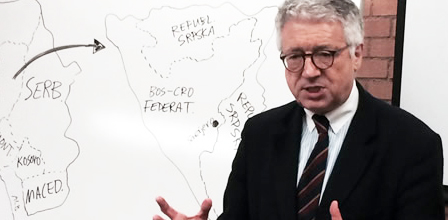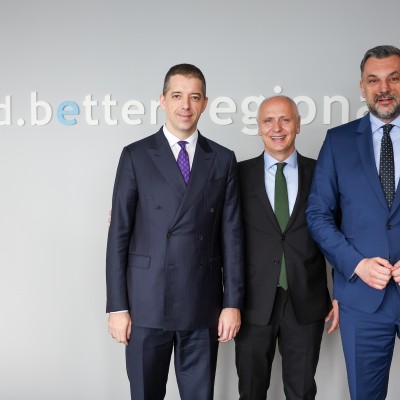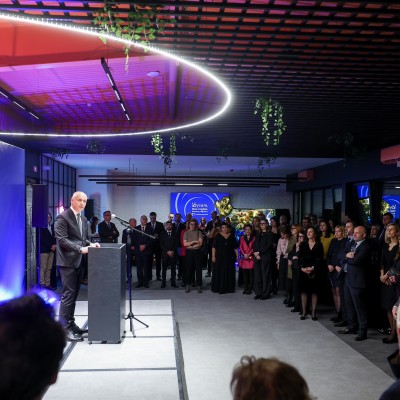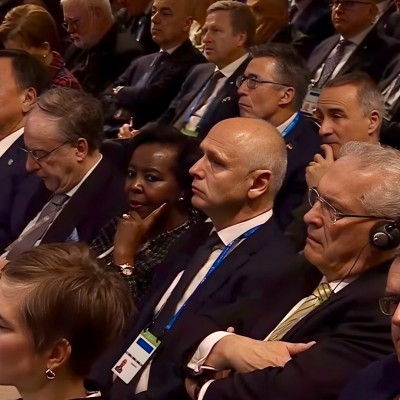Western Balkans Civil Society - Progress in the Making
26 August 2015

Dr. Wolfgang Petritsch, President of the Austrian Marshall Plan Foundation (Photo: http://www.erstestiftung.org/)
As leaders from the Western Balkans and the EU gather in Vienna for the second leg of the "Berlin Process" on August 27th, they will not be alone. For the first time, in what represents a big step forward for the Western Balkans; politics and civil society will meet at eye-level.
On August 26th, the day before the Summit, a civil society day, culminating in the Civil Society Forum, which brings together civic and government representatives. The stated goal is to agree upon proposals to be submitted to the political leadership of the region.
This novel approach to create citizen ownership as regards the respective public agendas, takes advantage of Austria’s expertise in bringing together diverse and developing civic groups in the region. It is my deep belief that without the active grass roots engagement of the young generation in public affairs, joining the European mainstream will remain feeble. If, however, the Vienna initiative is successful, a big leap forward is to be expected.
It will motivate the Western Balkan states to continue their modernization process both in their states and in the wider region. This important initiative will - in the longer run - undoubtedly contribute to the Summit's objective to increase democratic representation and regional connectivity. This bottom-up strategy will allow governments and societies to again be fully reconnected. Yugoslavia is gone forever, but what is termed "Yugosphere" needs to be filled with a new civic spirit and resolute governmental activity.
There is already agreement on critical issues such as education, culture and freedom of the press, issues that will dominate the civic working groups and the political Summit alike. Throughout the region a strong desire for sweeping reforms on these and other issues is virtually palpable throughout the region. A recently published study by the Friedrich Ebert Stiftung, based on interviews with 10.000 young people, comes to the conclusion that persistent unemployment, drastically reduced perspectives and the resulting brain-drain are the main threats for the states of the region. This is old and bad news, it therefore needs an urgent response.
In view of the recent escalation of the conflicts in the Middle East and in sub-Saharan Africa the Balkans countries are facing yet another - humanitarian - crisis which can only be resolved together. Macedonia and Serbia, in particular, need the help and solidarity of all of us. This developing human catastrophe must be arrested under any circumstances. Its professional and humane management is a duty to be taken seriously. NGOs have to see to it, that all asylum seekers are treated as human beings in desperate need. And the EU, specifically Austria and Germany, need to step up to this all-European challenge. Unregulated mass migration has therefore to be added to the Vienna agenda.
If handled cooperatively, the Vienna gathering could demonstrate the virtue of cooperation - short- and long term. It could, in fact, represent a key stepping stone towards integration.
The encouragement of a critically engaged and active civil society is a necessary step that all Western Balkans states must take. It is a key prerequisite for moving swiftly towards the EU. Without a strong civil society, these states - each of them in their specific cultural individuality - will hardly fit the integration promise of an "ever closer" European Union. Thus the Summit’s declared intention to welcome civil society engagement is a strong signal that the region has finally started to tackle its own deficiencies and challenges.
While there is still much to be done in regards to civil society in the Western Balkans, the Vienna Summit - inclusive as never before - could retrospectively be viewed as an important marker of progress in the region of the Western Balkans.
![]()
Dr. Wolfgang Petritsch was the EU's Special Envoy for Kosovo* (1998-1999), EU chief negotiator at the Kosovo peace talks in Rambouillet and Paris (1999), and then High Representative for Bosnia and Herzegovina (1999-2002). He served as the Austrian ambassador to the UN in Geneva (2002-2008) and to the OECD in Paris (2008-2013), and was the Joseph A. Schumpeter Fellow at Harvard University (2013-2014). He is currently the President of the Austrian Marshall Plan Foundation.
* This designation is without prejudice to positions on status and in line with UNSCR 1244 and the ICJ Opinion on the Kosovo declaration of independence.



